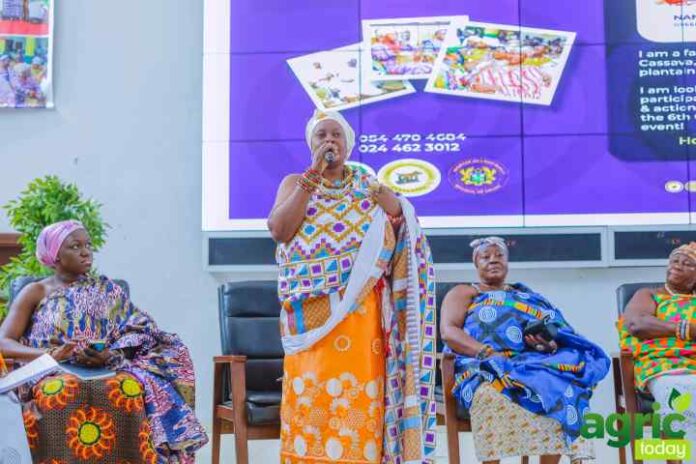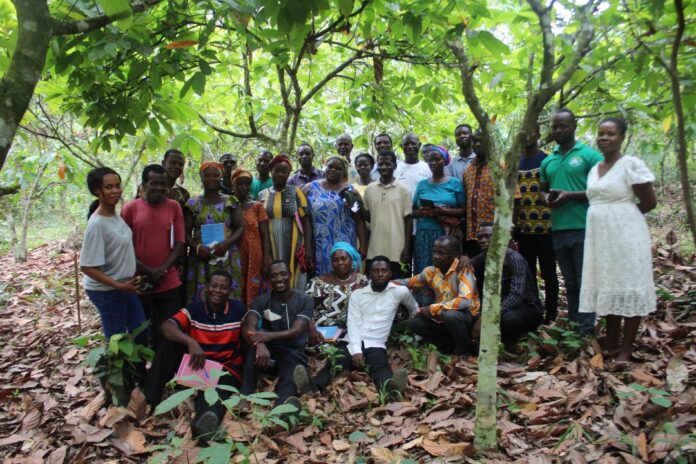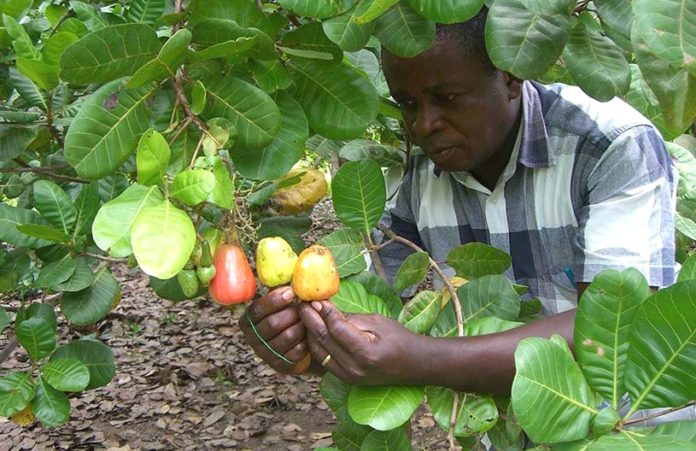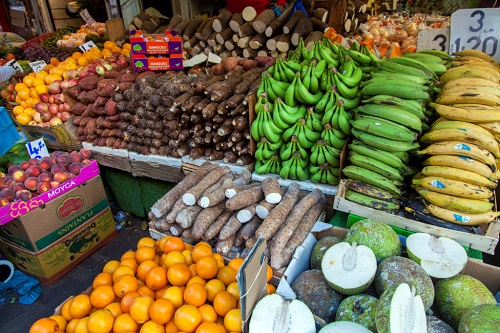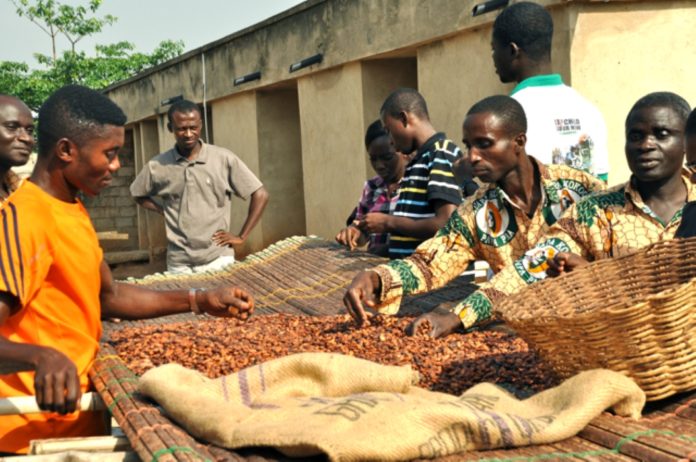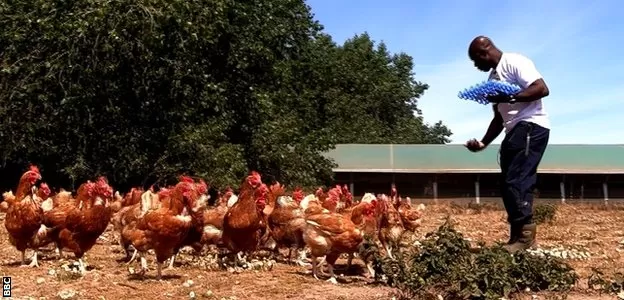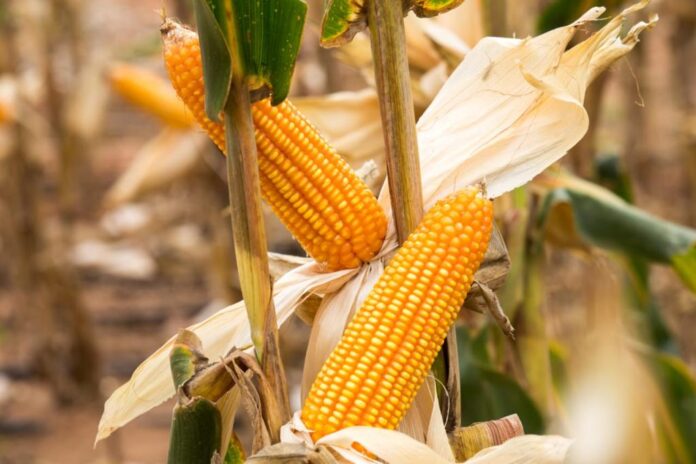The Queen Mothers in Ghana have called on the Ministry of Food and Agriculture to engage directly with farmers to understand the challenges the farmers encounter during production.
No more free pepper – Ga Kenkey Sellers warn
Some Ga Kenkey vendors in Accra are now considering charging customers for the previously complimentary pepper as economic challenges in Ghana worsen, contributing to a broader increase in the cost of living.
The latest economic data indicates a marginal rise in the year-on-year inflation rate for January 2024, with the current inflation rate reaching 23.5%. Ghana joins other Sub-Saharan African countries grappling with notably high inflation rates.
Essential ingredients for staple meals, such as Jollof, Banku, Fufu, and Kenkey, have witnessed inflation rates surpassing 40% in January.
Fresh tomatoes, carrying a significant 1.2 weight in determining national inflation, have surged by 52.3%, while other crucial elements like pepper, onions, and fish have inflation rates double the national average.
Despite being one of the more affordable food options in Accra, Ga Kenkey is expected to see a price increase. The local delicacy, traditionally served with pepper sauce, slices of onions, tomatoes, and fish, may no longer include these accompaniments free of charge.
Kenkey sellers are contemplating a review of their operational costs to cope with the continuous surge in market prices. Consequently, the previously complimentary pepper sauce with slices of onions and tomatoes might now come with an additional charge.
Many Kenkey vendors cite the high pricing of goods in the market as the driving force behind their decision. The shift raises questions about the perspectives and experiences of these market workers in the face of economic challenges.
“The prices of goods have gone up in the market. The price of the green pepper has increased astronomically. If we don’t increase the prices of kenkey, we will run at a loss.”
“There’s a high possibility we might start selling the red pepper and the shito. We can’t continue to give it for free. We will package them in small bottles and sell them. Very soon the pepper will be sold.”
Some patrons of Kenkey have shared varied views on this decision to price the pepper accompaniment, previously provided for free.
“I like kenkey so if the pepper is going to be sold, we will buy it. Prices of goods are very high now, it’s not their fault, so I understand them.”
“I think it’s outrageous,” another said.
Speaking to Citi News, General Secretary of the General Agricultural Workers Union (GAWU), Edward Kariwe, explained the rationale behind the pricing of goods by farmers before reaching the market.
Edward Kariwe believes that this decision by Kenkey sellers to increase pricing is only a reflection of the government’s failure within the agriculture sector.
Also, the Ranking Member on the Agric and Cocoa Committee in parliament, Godfred Seidu Jasaw, believes that the government would have to provide proper incentive systems for farmers to improve the agricultural sector.
“It’s not the farmers creating the price hikes, at the farm gate, it’s low but then you will also have to sympathise with those who make it possible to pick up the produce from the farm gate to the market centres.
“It has to go through a mirage of challenges, bad roads, fuel cost and other labour cost along the value chain. About one-third would have rotten by the time it gets to the markets,” he said.
Farmer groups and their communities urged to adopt Integrated Management Systems
The Conservation Alliance International has partnered with Rainforest Alliance, an International Non-profit Organization to support farmer groups and their communities to address broader landscape issues by practicing Good Agricultural Practices (GAPs) in their various farms.
Liaison Lead for the project, Raymond Owusu Achiaw, speaking at the initial meeting held at Twifo Afeaso in the Central Region for over 30 farmers of the Conservation Cocoa Association, explained that “Strengthening the Traceability, Accountability, and Resilience of Farmer Groups (STAR) project” is tackling two key areas in sustainable cocoa production in Ghana namely Geodata and Landscape approaches.
According to him, all targeted farmer group members will have farm geodata by mid-2024 and also 70% of targeted farmers are expected to adopt certification in their operations linked to Rainforest Alliance certification standards.
He stated that through tools like farm data collection and a dedicated geodatabase, the project will empower 30 target farmers in Ghana’s Kakum landscape to adopt Integrated Management Systems (IMS) which will help them achieve certification.
“Our project will also address broader landscape issues by promoting Good Agricultural Practices (GAPs) and also equip farmers with business skills through the SMART approach which will help them see “farming as a business” he said.
Field Co-implementation Lead, Ama Akyema Sasu mentioned that the initial phase of the project will identify knowledge gaps, while subsequent phases bridge them through farmer field school trainings.
She explained that they are working to increase net yields of target farmer group members and also increase net income of farmer group members in the selected communities.
“I am hopeful that this project will increase the percentage of farmer group members with traceable farms which will impact positively on cocoa production” she stated.
Field Implementation Lead for Conservation Cocoa Association, Ebenezer Darko was optimistic that formalizing relationships with international organizations like Rainforest Alliance would propel them implement Good Agricultural Practices in their communities.
“It is our hope that 80% of target farmer groups will adopt good agricultural practices and about 70% of target farmers adopt a Marketing and Rural Transformation (SMART) approach in their operations” he added.
High cost of sachet water triggers return of iced water.
Drinking water, a very important lubrication for the body system, has gone through many prices in the past few years, as Nigerians grapple to meet up with the increasing high cost of living.
Now, a bag of sachet water that was sold for N50 naira is now N500 in some areas.
Those who purchase water in less quantity now buy a sachet or two for N50.
Even the well-to-do Nigerians have gone through various means to cut costs in the area of water consumption.
Some have dumped bottled water, which now costs N300 per bottle in some cities; they now improvise by carrying sachet water in used bottles.
Some have resorted to boiling borehole water and sieving it into empty used bottles after it cools off.
This has reduced patronage and, subsequently, dropping the income of beverage hawkers.
Economy & Lifestyle discovered that to make ends meet, these hawkers have now returned to iced water (water poured in white nylons and refrigerated or added to block to get cold), as it was years back, which comes cheaper and affordable.
Such sellers are seen in school vicinities, market places and motor parks in smaller towns and cities in the country.
Mrs. Dorathy Ehis, a seller of sachet and bottled water in Benin said she had to improvise by selling ice water to increase sales.
“I never thought ice water would be sold in Nigeria again since the 90’s.
“But the continuous increase in the price of sachet and bottled water has left many drinking borehole water.
“My sachet and bottled water business is not moving at all.
“A bag of sachet water is sold for N500 here. It was sold for N300 a few months ago.
“In a day I sell 40 bags of pure water because those hawkers used to buy from me. But now, they only buy a few.
“So I added the selling of ice water which goes for three N20 because of the cost of nylon and boiling of borehole water before icing it.
US$7bn cashew market still untapped
With an average estimated cashew export earnings of US$350million per annum, Cashew Watch Ghana (CWG) – a civil society organisation – has said the country has yet to fully take advantage of the US$7billion global market.
Cashew Watch Ghana described the current earnings as below potential, emphasising that the country has potential to fetch more than US$660million if government and the private sector capitalise on the current global prospects of the economic tree to promote production, value addition and exports.
The country’s cashew export earnings in 2020, which was US$340million, according to CWG, should only be a starting point to make more progress toward harnessing the full potential of the sector.
With an estimated annual production of between 110,000 and 130,000 tonnes of raw cashew nuts, the CWG advocated that more efforts be put in place to enhance production, storage and value addition. If harnessed properly, it said the sector will be able to contribute significantly to not only job creation, but poverty reduction.
Globally, the market size of the nut crop is currently around US$7billion and projected to hit a value of US$10.5billion by 2031, according to CWG.
With the current annual production, the African Cashew Alliance has estimated that about 85 percent of the raw nuts are exported, with the crop, in the past five years, being one of the top non-traditional export commodities of the country.
Despite this, the sector is plagued with many challenges, including low production volumes, poor value chain coordination and inadequate support.
For instance, although there are 14 cashew processing factories nationwide, the majority of them have either shut down or are producing undercapacity due to lack of raw cashew nuts.
Processed cashews offer a variety of products, including snacks, food ingredients, cashew milk, cashew butter, cashew cheese, cream, yoghurt, medicine, powder, oil, skin pomade, biofuel among others.
Notwithstanding the benefits the country enjoys from the cashew value chain, especially export earnings from raw nuts, there are huge untapped opportunities which could be maximised.
The cashew processing sub-sector, which is deemed profitable and accounts for almost half of profits in the industry, comes with several challenges – including labour costs, quality control, energy costs, logistics, price fluctuations, among others.
Prices of foodstuff to remain high until June 2024 – GAWU
The General Agriculture Workers Union (GAWU) is forecasting that prices of foodstuff would remain high until June when the harvesting of food would begin.
This is coming after food inflation fell consecutively for the last six months to 27.1% in January 2024.
Speaking to Joy Business, General Secretary, Edward Kareweh, warned that the prices of food would not get better any time soon.
“Well, the price of food will not get better anytime soon. Looking at the country as a whole, we are entering into or are already in the lean season of production and no part of the country is experiencing harvest of foodstuff, particularly the major samples”.
“If we look at maize, it’s not being harvested anywhere in the country. Similarly, rice is also not being harvested unless those in the irrigation areas”, he added.
He continued saying most parts of the country are not experiencing rainfall.
“Generally speaking, there are no rains throughout the country, and at this time also the Western parts of the country will begin preparation of their farms for the major season”.
“During this season, all the foodstuff we are eating is from last year. So don’t expect food prices to come down now”, he pointed out.
Furthermore, Mr. Kareweh said “we expect that by the middle to the end of March [2024], food prices will go up and stay high like that until we begin to harvest around June/July in the Southern parts of the country”.
Ten out of 15 Sub-Class register inflation higher than overall food inflation
Seven divisions recorded inflation rates higher than the national average.
They are Alcoholic Beverages, Tobacco and Narcotics (38.5%); Personal Care, Social Protection and Miscellaneous Goods and Services (32.0%); Restaurants and Accommodation Services (29.2%); Furnishings, Household Equipment and Routine Household Maintenance (27.7%) Food and Non-Alcoholic Beverages (27.1%); Health (26.6%) and Recreation, Sports and Culture (24.9%).
Cocoa market is currently bullish – COCOBOD CEO
Cocoa prices are currently doing well on the international market hence Ghana is going to soon experience a better picture of its local market, Chief Executive Officer of the Ghana Cocoa Board (COCOBOD), Joseph Boahen Aidoo, has said.
He noted that the cocoa sector in Ghana performed poorly between the period 2017 and 2020 because the prices on the world market had collapsed by 30 percent.
Although production went up in 2020, the prices were not the best on the international market, a situation that affected the local market as well, he added.
The International Moneyray Fund (IMF) recently said that the state-owned entity mandated with facilitating cocoa production and exercising export monopoly—has long registered losses due to the absence of a systematic mechanism for setting producer purchase price (PPP), significant quasi-fiscal activities (roads construction and input subsidy programs), and large administrative costs.
The debt accumulated by COCOBOD over the past few years became too expensive to service and had to be restructured.
Appearing before the Public Accounts Committee (PAC) of Parliament on Tuesday February 20, Mr Joseph Boahen Aidoo said “Mr Chairman we are on the path of a turnaround. COCOCOB’s financial situation is dictated by the international market price, that is the word cocoa price. and we all know that from 2017 to the date in question prices of cocoa in the world market had collapsed by 30 percent.
“In 2020 that is also when we had our highest reduction, so when prices collapsed at the time when we had increased yield, definitely, your direct course and inventory go up whereas the revenue generated goes down. That is what explains the huge e deficit for that period. essentially, yes we had record production but prices at the international market did not favour us. ”
Assuming the prices on the world market keep falling, what are you going to do to break even as a company? he was asked by the chair of the PAC James Kluste Avedzi.
In answer, he said “For the past years what we have been doing is taking measures to cut down the cost of operations and other activities. But currently, as we speak the market is going bullish, cocoa prices have relished, there is an ever record so we strongly believe that in the coming years, we are going to see a better picture. It’s bullish, it is not something that is going to ease too soon because the fundamentals are going to keep the prices there for the next three years
Poultry farmers call for urgent intervention by government to revive sector
Poultry farmers are calling for an urgent government intervention to help revamp the sector.
The importation of poultry products amounted to approximately GH¢868.8 million, about 7.7% of total imports in 2023.
According to the President of the Greater Accra Poultry Farmers Association, Kwame Anim Somuah, the high cost of borrowing makes it difficult for farmers to remain sustainable amidst the increasing market demand.
He emphasised the challenges faced by farmers who heavily rely on egg production to sustain their businesses.
“Most poultry farmers depend solely on egg production to sustain our business. Unfortunately, along the line when you lose your birds and you are not getting any support from the government it becomes so difficult to be in business.”
“This is because most farmers have borrowed money from banks with very high-interest rates. This puts the farmers in a very desperate situation,” he added.
However, the Chief Executive Officer (CEO) of GAPFA, Isaac Awuzah, emphasised poultry farmers commitment to boosting local production and reducing reliance on imports.
“Last year with the help of IFE a German company,” he explained, “We’ve acquired a 15 metric tons per hour machine that is going to augment the existing ones that we have. It means if we were producing 3000 bags a day, it means we are going to quadruple it, and in that sense, we can go to the various regions of the country. This year, we are going to increase the production massively.”
Poultry farming has become a crucial business in the agriculture sector in Ghana, playing a significant role in the nation’s economy and ensuring food security.
Recent statistics indicate that as of 2020 the poultry industry contributed to about 16% of the total livestock production in Ghana.
The sector achieved an annual production of over 128,000 metric tons of poultry meat and nearly 2.3 billion eggs. The national demand for poultry meat alone is about 400,000 metric tons with local production of just about 57,871 metric tons.
Global Agri-business Firm, Olam Agri Temporarily Suspends Purchase Of Maize, Sorghum From Nigerian Market Over Food Scarcity
The company said the suspension would allow it to closely monitor market trends and adjust to market realities.
Olam Agri in Nigeria, a provider of differentiated food, feed, and fibre products, has temporarily suspended the procurement of essential grains such as maize and sorghum immediately.
The company said the suspension would allow it to closely monitor market trends and adjust to market realities.
Olam Agri said it “recognises the nation’s significant challenges of food insecurity”.
It said, “As a major buyer and processor of food staples, we share the concerns around the high prices and supply chain disruptions affecting the availability of essential grains.
“In response to these challenges, we are actively collaborating with industry peers and government authorities to identify and implement strategic solutions to alleviate any additional stress on food availability.
“As part of our proactive approach, Olam Agri in Nigeria has decided to temporarily suspend the procurement of essential grains such as maize and sorghum immediately which will allow us to closely monitor market trends and adjust to market realities.
“This decision follows wide consultations with relevant authorities and is part of our commitment to manage the ongoing crisis.
“During this period, our commitment to contribute to local food production capacities remains unwavering as we will ensure uninterrupted distribution of food supplies to the public.
“Our longstanding practice of sourcing essential grains from local Nigerian farmers has supported thousands of livelihoods and met the country’s demand for critical nutrients in daily diets.
“We are steadfast in our commitment to driving sustainable socio-economic development and food security in Nigeria. We are committed and will continue to work closely with authorities to contribute to stabilising the current market challenges.”
Wonfliki partnered EOS Data Analytics to transform agriculture
Wonfliki, a Ghanaian AgTech innovator, is collaborating with EOS Data Analytics – a global leader in AI-powered satellite imagery analytics – to propel it to the forefront of the country’s AgTech sector and reinforce its commitment to sustainable agricultural practices.
In response to the challenges faced by Ghana’s agriculture sector characterised by traditional family-run farms with limited surpluses, Wonfliki has joined forces with EOS Data Analytics to usher in a new era of modernisation and enhanced productivity. This partnership aligns seamlessly with Wonfliki’s dedication to mitigating risks in crop farming and ensuring proper land titles for farmers.
Wonfliki is set to leverage this partnership to deliver advanced crop monitoring services. This revolutionary technology will empower farmers and agribusinesses across local and continental landscapes, streamlining operational efficiency and conserving crucial resources.
Ghana’s agriculture industry which is projected to reach a market size of US$3.4billion in 2024, stands to benefit significantly from this collaboration. With Wonfliki’s commitment to bridging data gaps, enhancing farm productivity and contributing to sustainable agricultural development, the partnership addresses the evolving needs of the sector.
The partnership grants Wonfliki access to comprehensive satellite imagery data, offering valuable insights into crop health, predictive weather patterns, and farm conditions. This information, available for remote access by farmers and agribusinesses, heralds a new era in the utilisation of agricultural data.
Hillary Adare, Founder of Wonfliki, expresses enthusiasm about the partnership: “We eagerly anticipate harnessing this collaboration to improve farmers’ productivity using data-driven strategies. This venture not only elucidates cause-and-effect dynamics in farming, but also drives economic growth by enabling budget-informed decisions for agricultural businesses”.
Rim Elijah, VP of Sales at EOS Data Analytics, echoes this enthusiasm, stating: “We are thrilled to commit to advancing sustainable agricultural practices in Africa and enhancing technological adoption for the benefit of both individual agribusinesses and governmental bodies”.
Looking ahead, the partnership with EOS Data Analytics positions Wonfliki to engage with stakeholders and farmers in the agricultural domain, aligning with its commitment to augment efforts in the sector. Together, both organisations are determined to expand their impact by providing innovative solutions to a broader range of farmers, industries and government-led initiatives in the region.
What this means for the market
This partnership signifies a significant leap forward in the modernisation of Ghana’s agriculture sector.
With advanced AI technologies and satellite data analytics at its core, Wonfliki – in collaboration with EOS Data Analytics – is set to help farmers get more from their hard work. The technology has the ability to monitor crop health in real time, and coupled with access to forecasted weather information, it empowers farmers to make informed decisions.
The farm management system cuts costs and contributes to resource savings, aiding in effective farm management.
As Ghana’s agricultural landscape evolves, the integration of technology promises a future marked by resilience, sustainability and unprecedented growth; and Wonfliki aims to be a part of this story.

